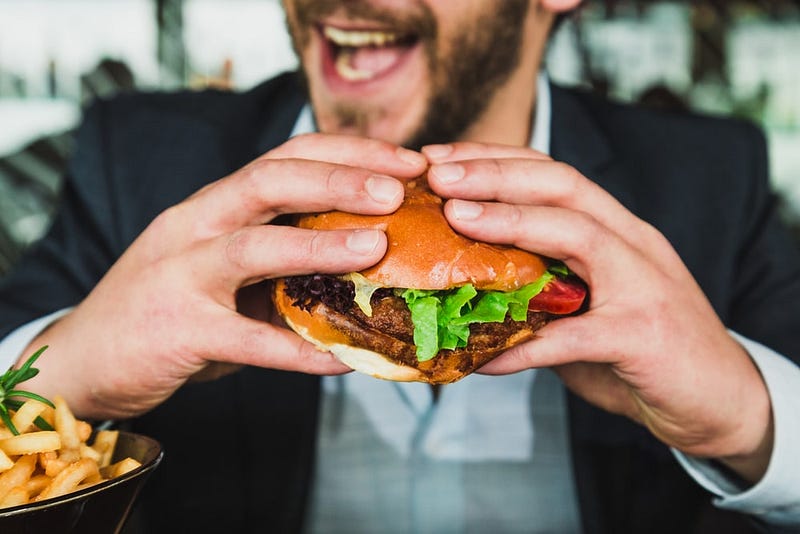# Understanding Poor Food Choices: A Path to Healthier Decisions
Written on
Chapter 1: The Dilemma of Food Choices
Why do we often opt for foods that we know are not beneficial for us? This question plagues many as they navigate their dietary decisions.

“Energy is the cornerstone of health.” — Dr. Catherine Shanahan
Grasping this concept helps illuminate the reasons behind our poor food choices. Although we hold the reins of our decisions, our physiological state can often hinder us, making it challenging to select healthier options. Thankfully, we can safeguard ourselves by establishing our choices before we find ourselves in tempting situations.
Section 1.1: The Energy Crisis
“When your energy wanes, your thoughts and behaviors shift.” — Dr. Catherine Shanahan
The commercials featuring Snickers hit the nail on the head; we aren’t quite ourselves when we're hungry. Our physiological state changes dramatically.
“If you have cravings for sweets or starchy foods, it's not merely your desire at play. It’s your energy-depleted brain that’s igniting an unusual and intense hunger.” — Dr. Catherine Shanahan
This innate drive for food—especially unhealthy options—has roots in our evolutionary past. In ancient times, when food was a scarce resource, our very survival hinged on our ability to find high-calorie sustenance. If we didn’t eat, we wouldn’t survive, and our brains are still wired that way.
Couple this with the abundance of high-calorie, sugary foods available today that elevate our dopamine levels (the “more” molecule that incites us to seek more), and we have a significant challenge.
This explains why we make poor dietary choices, even when we are fully aware of their negative consequences. Despite writing extensively about healthy eating, I find myself reaching for unhealthy snacks when fatigue or hunger sets in. Becoming aware of the reasons behind these choices can be a crucial first step. For instance, last week, I spotted a box of chocolate-covered almonds in my pantry. I craved one, but upon reflection, I realized I was merely tired from a restless night. Acknowledging this impulse helped me resist the temptation.
However, awareness alone often lacks the strength needed to overcome the urge; it still demands willpower.
#### Subsection 1.1.1: Establishing Rules
Last night, while munching on popcorn, I pondered the reasons behind my choice. Although popcorn (especially homemade and oil-free) isn’t a terrible snack, there were likely healthier options available. I recognized that I was both tired and hungry, making popcorn seem like an easy choice in that moment.
To avoid similar poor choices in the future, particularly when fatigue and hunger strike again, I understood the need to implement rules. For instance, I have refrained from gluten for nearly a decade—a hard and fast rule. Regardless of how tired or hungry I feel, I won’t consume gluten.
If we can establish such rules, we increase the likelihood of adhering to them during moments of poor judgment. For instance, if I decided not to eat popcorn, I would be less inclined to reach for it. But at present, I lack that rule, meaning I face a choice when I’m hungry and fatigued—something I am ill-equipped to handle.
Making decisions ahead of time is key. Consider these rules as habits. For example, I habitually avoid gluten; I could also adopt a habit of skipping popcorn.
“Habits eliminate the need for self-control… A habit requires no decision from me, because I’ve already made that decision.” — Gretchen Rubin, Better Than Before
We all occasionally make poor food choices, and that’s acceptable from time to time. What truly matters is our overall patterns. However, if we aren’t cautious, these choices can accumulate rapidly.
By establishing rules and cultivating habits when we are not tired or hungry, we can prepare ourselves to make healthier decisions in challenging situations.
Chapter 2: Strategies for Health Improvement
Do you want to enhance your well-being, one habit at a time? Subscribe to my free weekly newsletter, Momentum. Each week, you’ll receive a new habit to try, along with its significance and tips for making it easier to adopt. This newsletter will guide you in creating the momentum needed to steer towards a healthier, happier life.
The first video discusses why seemingly healthy food choices may be detrimental to our health, emphasizing the importance of understanding our food decisions.
The second video explores the psychological factors that lead us to unhealthy eating habits, offering insights into how we can combat these tendencies.